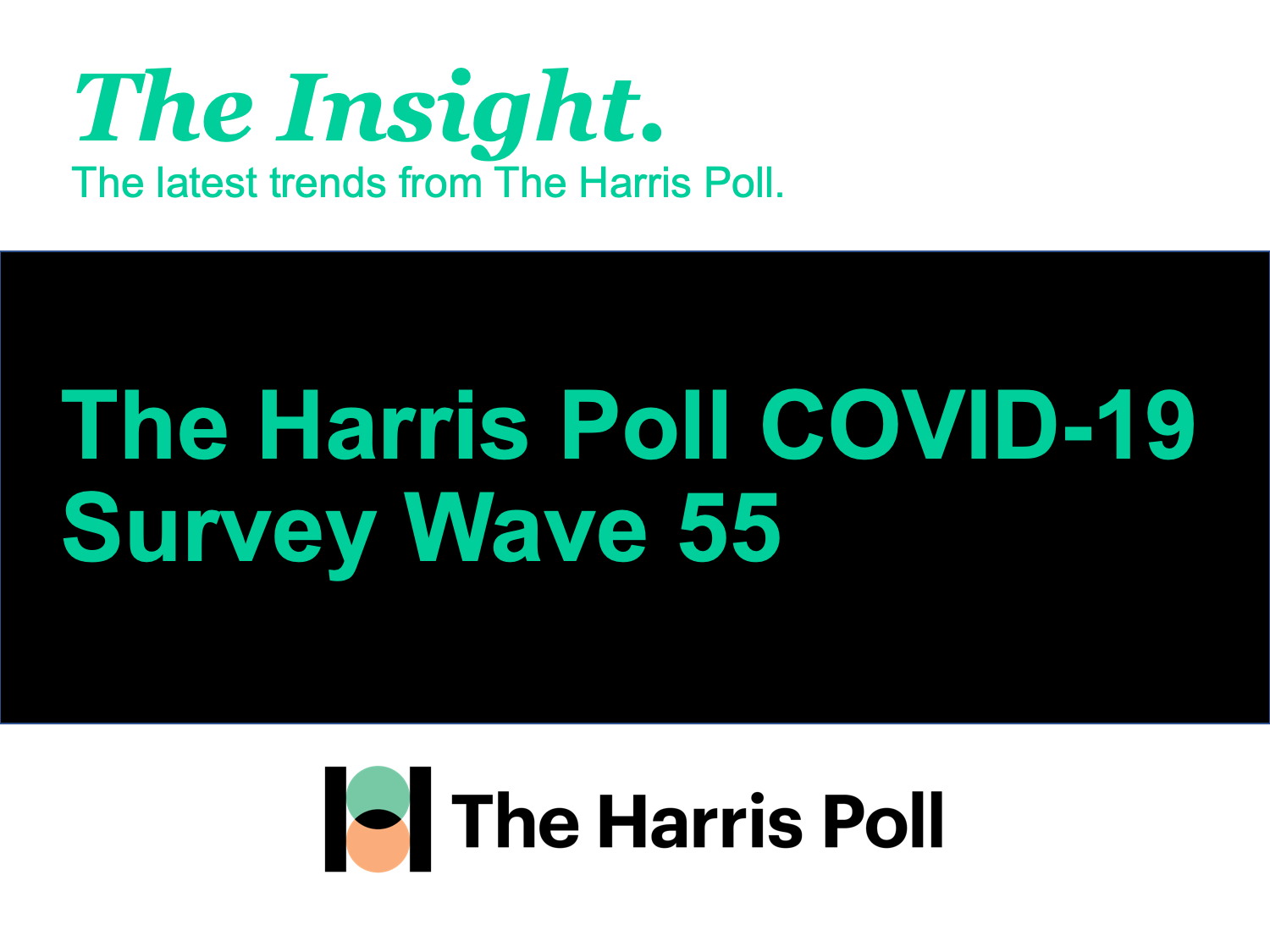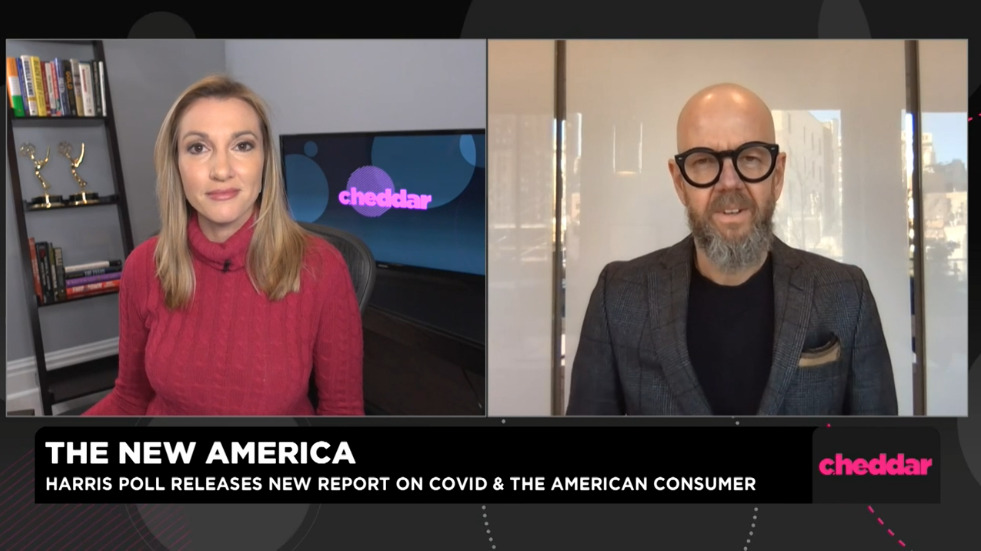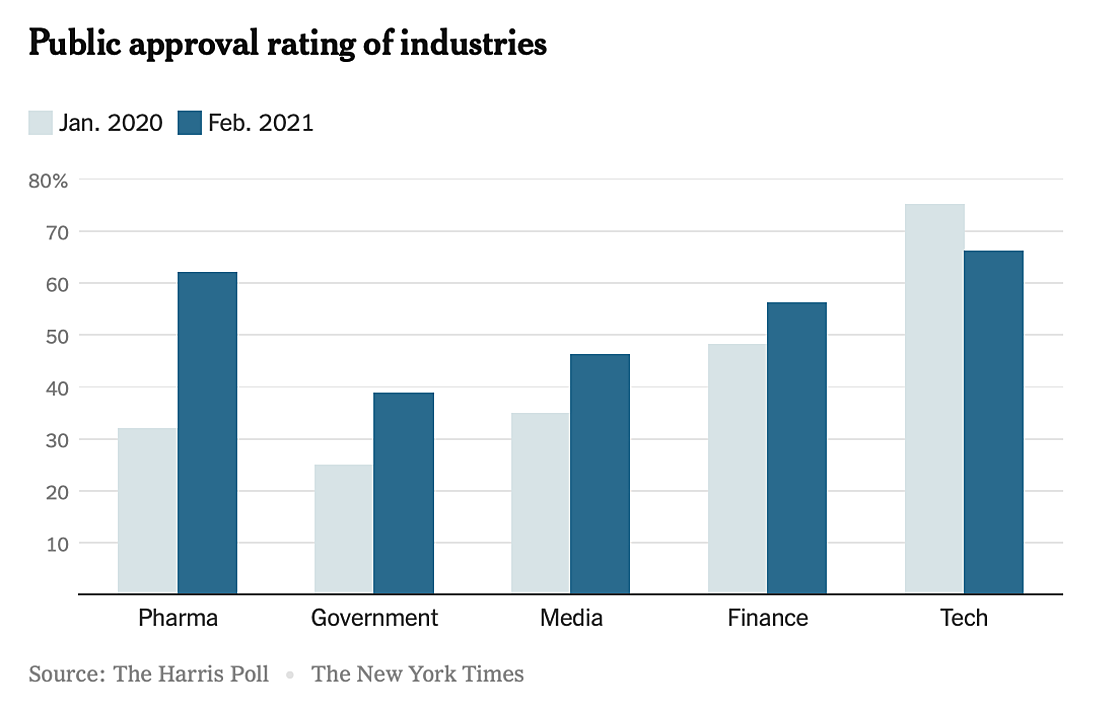Brief • 4 min Read

In The Harris Poll COVID-19 Tracker (Week 55) fielded March 12th to 14th, 2021 among 1,977 U.S. adults, we look at where we are one year after the onset of the COVID-19 pandemic, the unlikely heroes, and what we’ve learned after a year of self reflection.
As a public service, our team has curated key insights to help leaders navigate COVID-19. Full survey results, tables, and weekly summaries can be accessed for free at The Harris Poll COVID-19 Portal. We will continue to actively field on a regular cadence to track the shifts in sentiment and behaviors as the news and guidelines evolve.
The Great Awakening: A Year of Life in the Pandemic as Documented by The Harris Poll
Monday we released a special report on a year’s worth of The Harris Poll weekly COVID-19 tracker revealing new priorities in how we choose to live our lives, where we want to live and work, and how we choose to spend our time and money.
With over 55 consecutive weeks of consumer research, surveying over 114,000 people, we believe we have stood up the single largest comprehensive data set on life amid COVID-19.
This report examines loss, resilience and emergence. The pandemic is remaking many aspects of American life that we are only now beginning to understand. From values and beliefs to routines and relationships, change is underway across the nation.
Companies, in trying to recover, must adapt, evolve and understand the evolution of Americans, who are digitally accelerated, hyper-resourceful and ever-mindful. There will be new winners and losers in a transformed marketplace. But one thing is clear: conventional wisdom and assumptions no longer hold in a post-COVID America.
- Download the report
- Read the press release
- Join our webinar later today at12:30pm EST: 12 Months. 12 Findings. What it Means for Brand and Business Strategies After a Year of COVID.
- Mark Penn, President & Managing Partner, The Stagwell Group/Chairman & CEO, MDC Partners
- John Gerzema, CEO of The Harris Poll
- Tawny Saez, Director at The Harris Poll
- Ryan Linder, Global CMO & EVP at MDC Partners
- Robyn Freye, SVP at MDC Partners
COVID and the American Consumer: Cheddar-Harris Poll
This week John Gerzema, CEO of The Harris Poll, spoke to Cheddar about where the U.S. is after a year of enduring a pandemic and what the future looks like for consumers. Here is what he has to say:
- A savings dam is about to burst: Americans are gearing up for a spending free-for-all and consumer confidence continues to grow. Almost one-third (30%) of $100K+ households report that they expect to spend more than they did last spring. Two-thirds (66%) of Americans who have remained employed throughout the pandemic said that they were able to save more than they otherwise would have.
- CV-PTSD: The lingering psychological trauma of the COVID-19 pandemic will inevitably affect the way Americans shop. Nearly half (48%) do not want to use cash any more and (30%) are taking fewer trips to the store and stocking up on as much as they can when they do go.
- Meet and greet: The last year made Americans hyper-aware of what they touch and where they put their hands. With that, more than half (54%) say that they would be happy if they never had to shake another person’s hand again. Handshakes are so 2019.

Takeaway: Americans are ready to ride the digital acceleration wave. With companies finding ways to make in-person shopping an obsolete experience, consumers are ready to spend money.
Big Pharma’s Boost: NYTimes DealBook-Harris Poll
At the height of the pandemic, more than half of Americans were afraid of dying from the virus and a similar share were afraid of losing their jobs. Only in the past month, with vaccines rising and hospitalizations and deaths declining, is fear abating. Big Pharma is the unlikely hero of the pandemic, The New York Times says using Harris Poll data.
- Tipping the scale: Approval ratings rose for many industries from January 2020 to February of this year, but the reputation of the pharma industry — stained by its role in the opioid crisis and criticized for high drug prices — benefited the most. In January 2020, only (32%) of Americans viewed the industry positively; late last month, that had almost doubled, to (62%).
- Pharma to the rescue: And just less than half (44%) of Americans say their opinion of the industry has improved since the start of the pandemic — because of the actions the pharma industry has taken. In fact, on our Essential 100 ranking from June 2020, we asked Americans which companies they viewed as being part of the solution: Johnson & Johnson ranked #3, and Pfizer ranked #8.
- Harris Poll polling partner STAT News looks at a post-COVID pharmaceutical industry.

Takeaway: Stained by its role in the opioid crisis and criticized for high drug prices, the pharmaceutical industry will hope to maintain its strengthened image in a post-COVID world. “The pharmaceutical industry’s ability to innovate and perform under intense pressure and in a time of crisis is the ultimate validation for any business,” adds John Gerzema, CEO of The Harris Poll.
What We Learned About Ourselves in Lockdown: Axios-Harris Poll
Americans learned over the past year that they kind of like working and socializing from home, and might keep these parts of their pandemic lifestyles going even after offices, bars and restaurants become options again, according to our data featured exclusively in Axios.
- Home is here to stay: Three quarters (75%) of Americans said they learned during the pandemic that they prefer socializing in small groups at home over going out to bars. Three-fifths (59%) said they didn’t miss going out to bars to socialize as much as they thought they would, and (60%) said they’ve learned over the past year how much they love entertaining at home in small pandemic pods.
- Americans have also gotten used to working from home: (67%) said their lifestyles have gotten healthier while working from home, and (55%) said they’ve discovered that they didn’t miss the office as much as they thought they would. Two-fifths (40%) said they’d miss having extra time in the mornings if they have to go back into an office full-time.
- A different kind of getaway: Three quarters (74%) of Americans who are working from home said they’d consider taking a “workcation” – going somewhere else for a while, but working while there.
Takeaway: Even after the threat from COVID-19 subsides, we know life won’t simply return to what it once was. This year has altered everything from our media diets to our sense of work-life balance to our ideas of what’s fun, but through the hardships many have found the silver linings.
A Look Ahead
After a catastrophic year in which our lives came to a halt and we lost over 536,000 of our fellow Americans and millions around the world, there’s growing confidence that the ending of the crisis phase of the pandemic may be within reach.
- Pathway to immunization: Last week, President Biden directed all states to open vaccine eligibility to all U.S. adults by May 1st – an initiative in which (65%) of Americans are confident we will reach. Alaska and Mississippi are already there, while Ohio set March 29th as their date for all adults to be eligible.
- No more summertime sadness: Following the May 1st goal, (60%) are confident that we will “return to normal” by the summer – a 15-pt increase from just three weeks ago on February 21st. Three-fourths (75%) of Americans are optimistic that we will have all Americans who want the vaccinated inoculated by summertime.
- The Atlantic looks at “a quite possibly wonderful summer” in which the pandemic may feel like it’s behind us – even if it’s not entirely. Colorado’s governor pictures a “very close to normal” summer.
- Fear is slowly abating, but is still very real: Despite the increased optimism, most Americans (64%) still fear returning to normal public activity – down from (70%) on January 10th and (67%) fear leaving home for essential errands – down from (76%) during the same timeframe.
Takeaway: Americans feel the tide is turning: (69%) say the worst of the pandemic is behind us, up 7-pts from just two weeks ago. But still have a long way to go before we feel completely normal. If resiliency is the reward, let’s look back and see how we got there.
Subscribe for more Insights
Subscribe to our newsletter for the latest trends in business, politics, culture, and more.
Download the Data
This survey was conducted online within the U.S. by The Harris Poll from March 12 to 14, among a nationally representative sample of 1,977 U.S. adults.
Download
Subscribe for more Insights
Subscribe to our newsletter for the latest trends in business, politics, culture, and more.
Download the Data
This survey was conducted online within the U.S. by The Harris Poll from March 12 to 14, among a nationally representative sample of 1,977 U.S. adults.
DownloadRelated Content








